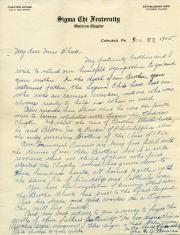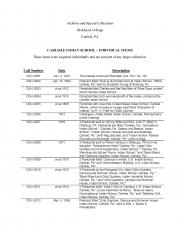Letter from Joseph Priestley to Rev. Mr. Kell

Joseph Priestley offers the Rev. Mr. Kell a horse for him to ride to Cradley. Priestley also includes 7 lines of text written in Annet's Shorthand.


Joseph Priestley offers the Rev. Mr. Kell a horse for him to ride to Cradley. Priestley also includes 7 lines of text written in Annet's Shorthand.

Mabel Abbott provides an overview of Joseph Priestley and his house in central Pennsylvania in "The Story of Joseph Priestley House" by Mabel Abbott.

Joseph Priestley writes to Jeremy Bentham, returning a friend's paper and alerting Bentham that he will be in the country for a month. Transcript included.

Benjamin Rush writes to his wife, Julia Stockton Rush, regarding poetry, the division of land, and his medical essays. Transcript included.

Medal of Honor recipient Horatio Collins King (Class of 1858) writes a five-page composition entitled "Reminiscences" in pencil. He discusses his Dickinson College experience and includes notes of planned citations from his journal.

Medal of Honor Recipient Horatio Collins King (Class of 1858) writes to Edward "Ned" Howard in San Francisco just before his marriage to Ned's sister, Esther. King describes his wedding attire and discusses mutual friends and colleagues.

Joseph Priestley writes to Rev. John Evans in London, thanking him for his "valuable book." Priestley sends a tract on baptism in return. Transcript included.

Theologian and scholar Joseph Priestley writes to his friend Theophilus Lindsey.

The collection includes bills, receipts, letters, and account books of Josiah Albertson's lime and lumber business in Plymouth, Montgomery County, Pennsylvania, which he later held in partnership with his brothers, Jacob and Benjamin. Also included are papers relating to the Plymouth Railroad Company (1831-1844), the Gwynyd Friends Meeting, and family correspondence.

Alexander Biddle, the patriarch of the collection, was born on April 29, 1819 in Philadelphia, Pennsylvania, the son of Thomas A. Biddle and Christine Williams Biddle. A member of a prominent and wealthy Philadelphia family, he graduated from the University of Pennsylvania in 1838 and became a successful lawyer—a profession that ran in his family and would continue in later generations. He married Julia Williams Rush in 1855—the granddaughter of Founding Father Benjamin Rush—which allows for both the Williams and Rush families to be well represented in this collection. It is Alexander, his wife Julia, and his seven children—Alexander, Henry, Julia, Wilmer, Louis, Marion, and Lynford, that make up a majority of this collection.
The Biddle Family Collection is housed in 11 document boxes. This collection consists primarily of correspondence between both friends and members of the Biddle Family as well as business associates. The collection is centered around Alexander Biddle (April 29, 1819—May 2, 1899), starting with him and progressing into an emphasis on his wife and children (Alexander, Henry, Julia, Wilmer, Louis, Marion, and Lynford) as well as other family members. The Rush family, via Alexander marrying into it, is also well represented.
These materials are arranged into the following 9 categories: Correspondence, Financial Materials, Legal Materials, Clubs/Societies, Invitations, Animal Business, Ephemera, Miscellaneous, and Photographs. This collection was generously donated by Samuel and Anna D. Moyerman.

Hazelle Myra Allen Brooks graduated from Dickinson College in 1934. This collection contains diaries kept by her as a college student and as a young mother during World War II. It also includes diaries kept by her mother, Essie Myra Comstock Allen.

The collection consists mainly of personal correspondence: fifty letters, most of which are from Carolyn Elizabeth Roberts Ayer to her husband Joseph Cullen Ayer (b. 1839) at various points in his life, beginning before their marriage (1861) when he was at Harvard; as a medical officer in the 18th Massachusetts Volunteers (1861-63); as a land speculator in Tennessee; and as a businessman in Boston. The collection also includes other family correspondence and legal materials, the latter comprised of family deeds and the settlement of Ayer's father's (Joseph Cullen Ayer, Sr. - 1846) and his mother's (Rachael Ellis Ayer-Washburn - c. 1888) estates. Miscellaneous materials include poetry and a medical thesis by Joseph Cullen Ayer, Sr.; printed materials contain three Civil War manuals.

Robert Hale Bancroft (?-1918) was born in Beverly, Massachusetts, and was educated at Harvard Law School and the University of Bremen in Germany. His travels abroad, as well as his interests in local events in Beverly, are reflected in this scrapbook dated 1864-1901. The bulk of the scrapbook consists of newspaper clippings from local newspapers; they note new inventions, the coming of the twentieth century, and his marriage to Elise Milligan. Bancroft's love of the arts is represented by the theater programs and snippets of poetry included in the scrapbook. Other items include maps, tickets and postcards from Germany, correspondence, and certificates from Harvard Law and University of Bremen.

The collection consists of the papers of Charles Gilbert Beetem, a Carlisle, PA rug manufacturer, local historian and genealogist, amateur artist, and omnivorous collector. Diaries, manuscripts, letters, advertisements, greeting cards, and extensive runs of Philadelphia and Carlisle turn-of-the-century theater programs are all included in the collection, as well as accounts of Carlisle and Cumberland County history. College memorabilia includes his own drawings for Dickinson's yearbook. The collection also contains the Conodoquinet Yacht Club Archives. Miscellaneous materials include journals and accounts for homes he designed and built as well as those for proposed real estate development in Carlisle. The correspondence reflects Beetem's longtime interest in U. S. island possessions, which is the subject of his large collection of publications and books housed in our library.

John Black, Jr. (1842-1915) attended Dickinson College between 1858 and 1860, before returning to his home in Lancaster, Pennsylvania to begin his career as a druggist. During the Civil War, Black served in the 122nd Pennsylvania Volunteers and the 47th Regiment of the Pennsylvania Militia of 1863. This small collection contains some materials documenting his family history, his high school and college experiences, and his military service and resulting pension.

The collection consists of correspondence and miscellaneous materials relating to Andrew Blair (1789-1861), a layman and founding member of the Second Presbyterian Church of Carlisle. In 1833, Blair successfully petitioned the Presbyterian Church in favor of founding a second church; he had become disenchanted with the current minister, George Duffield. Some of the correspondence relates to Blair's attempts to downplay the scandal that followed. Most of it, however, is written by Blair to his son-in-law, Rev. J.A. Murray, discussing both personal and church-related topics. The miscellaneous materials of the collection consist mainly of newspaper clippings, including obituaries for Blair, as well as items relating to town matters.

The collection consists mainly of correspondence between Arba Blodget (1879-1949), a Philadelphia drama critic and playwright, and his wife Laura and her family. Blodget and his wife had been separated early in their marriage due to his traveling with a theater company; often their only means of contact was via letters. There are also a few miscellaneous materials, such as the journal kept by Blodget beginning in October 1910, and accounts of his theatrical productions. Also included in this collection is a large amount of material relating to the Spooner family, who appear to have been connected to Laura Blodget's family; Charles Spooner was involved with John D. Rockefeller in the founding of the Standard Oil Company. The bulk of the Spooner portion of the collection focuses on the personal and financial correspondence of the family.

The collection contains materials relating to family life on the Eastern Shore of Maryland and in Ohio. The central figure is Daniel Bowdle (1796-1876), who as a young man moved to Cincinnati and became the successful business man of his family, with real estate and other interests. He aided his less fortunate kin in Talbot County, MD, including making provisions for the old age of James Lloyd, a beloved slave. The letters of William James Bowdle (1834-1876; Class of 1854) reflect student life at Dickinson College; letters of numerous other relatives are supplemented by genealogical notes on the Bowdle Family. Also included are papers on the settlement of the estate of Capt. Patrick Dickey, dated 1806-1841, which involve lands in Ohio and in Mason Co., VA.

This collection contains materials documenting the personal and business lives of George W. Bowman (1809-1887) and his son Harry Leader Bowman (1848-1915). It also documents the death of George's wife and Harry's mother, Ann Leader Bowman (1813-1885).
The photographs series in this collection includes images of family members and Dickinson College students. Several folders contain carte de visites of Dickinson graduates from the Classes of 1867, 1868, 1869, 1871, 1872

James Buchanan was a graduate of Dickinson College, Class of 1809, who went on to become the fifteenth president of the United States. The majority of this collection is comprised of correspondence between Buchanan and his business and political associates; over four hundred letters penned by Buchanan are included in the collection. Drafts of speeches, printed pamphlets, and various memorabilia are also represented.

These items about the Carlisle Indian School were acquired by the Dickinson College Archives and Special Collections individually and are not part of any larger collection.

These photographs about the Carlisle Indian School were acquired by the Dickinson College Archives and Special Collections individually and are not part of any larger collection.

Marcia Chamberlain was a friend and correspondent of poet Marianne Moore. This collection contains letters exchanged between the two women and other acquaintances, as well as a small amount of writings, photographs, and ephemera.

Charles Collins (1813-1875) was a native of Maine and a graduate of Wesleyan University (1837); he served as president of Emory and Henry College (1838-1852), of Dickinson College (1852-1860) and as proprietor and President of State Female College in Memphis, Tenn. (1860-1875). The collection consists of correspondence, financial materials, literary materials, and printed materials. There are only minor amounts of correspondence, financial and printed materials. The bulk of the collection is the literary materials which include diaries, memoranda books, and compilations of sermons. The diaries cover Collins' spiritual life, his early presidency of Dickinson College, his decisions to leave Dickinson, and the effects of the Civil War in Memphis. The diary dated 1842-1874 has very scattered entries while the 1855-1872 diary contains copies of Collins' correspondence. Much of the financial material relates to Dickinson College, including two account books for subscriptions to the college and to a special telescope fund.
Three journals in this collection have been digitized and are available for reading online (see links for related entries below).

Moncure Daniel Conway was born into a southern aristocratic family, but ultimately became one of the nation's leading abolitionists and humanitarians. Conway was a graduate of Dickinson College in 1849 and was trained for the ministry at Harvard Divinity School. The collection consists mainly of correspondence relating to all phases of Conway's career; his student days at Dickinson and at Harvard, his anti-slavery witness, and his pastorate at South Place Chapel in London. His letters reflect his wide acquaintance with leading intellectual and political figures of his day; some of his correspondents include Ralph Waldo Emerson and Dr. Annie Besant.
The journal in this collection has been digitized and is available for reading online (see the link for related entries below).